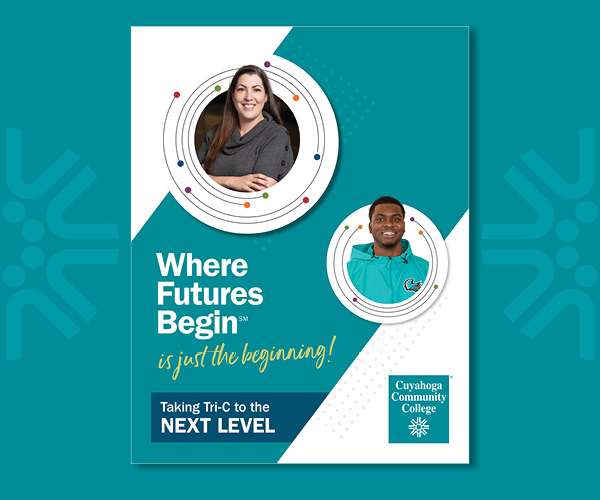Tri-C Evolves To Address Changes in the World of Work and How Students Consume and Receive Education
College’s new educational approach will deliver a better experience and outcomes
 What does a next-level college look like, and what kind of experience should it provide to students? Cuyahoga Community College (Tri-C®) has answered that question with a new approach that will allow students to break free from the traditional higher-education model.
What does a next-level college look like, and what kind of experience should it provide to students? Cuyahoga Community College (Tri-C®) has answered that question with a new approach that will allow students to break free from the traditional higher-education model.
The College's new approach gives students options that better align with their lives. Simplified and streamlined processes make it easier for students to navigate and control their destiny.
"We are evolving and adapting so that our students can be more successful in a rapidly changing landscape," said Tri-C President Michael A. Baston, J.D., Ed.D. "That involves recasting the traditional higher education model and becoming better at forecasting the future of work so we can help shape and build that future."
Tri-C leaders gathered input from students, staff, faculty and representatives of the Northeast Ohio business community. Three themes emerged, which shaped Tri-C's approach: build a culture of clarity, improve the student experience, and strengthen the College's value proposition.
Since navigating higher education can be overwhelming — particularly for first-generation students and adults returning to school — Tri-C sought to make improvements that begin with basic student processes and extend to the College's overarching academic structure.
To build a culture of clarity, Tri-C streamlined its processes to make it easier for students to apply, enroll and register. The College also transitioned to a new, student-centric structure that aligns credit and noncredit programs into five academic schools that will be in place for the Fall 2024 semester:
- School of Liberal Arts and Sciences
- School of Creative Arts
- School of Advanced Manufacturing, Engineering and Computer Science
- School of Nursing and Health Professions
- School of Business, Legal Professions and Hospitality
Schools will provide clear pathways that match career goals with the appropriate program, leading to quicker attainment of degrees and credentials. Each school will house noncredit and credit programs that provide stepping stones to academic and career achievement and ensure that degrees and credentials meet the needs of local employers. Students will be assigned to a school when they declare a major and will receive more personalized career guidance, attention and academic support.
Arranging programs by "schools" aligns Tri-C more closely with four-year institutions and makes transferring easier for students seeking a bachelor's degree.
To improve the student experience, Tri-C also enhanced its enrollment and payment processes and created more robust support teams for students. In addition, the College continues to expand its flexible course schedules (options include courses that are eight, 12, 14 and 16 weeks long), as well as in-person, online and hybrid class options.
Improvements already initiated include:
- One application for noncredit and credit students to help students seamlessly transfer between noncredit and credit courses
- New 12-week class option for students who begin admission and onboarding after 14- and 16-week classes have begun
- Simplified course option definitions to help students make selections based on learning style preferences
- Awarding scholarships to credit students without requiring an application and a simplified scholarship application for noncredit students
- Increased visibility of the Online Readiness Experience to improve student success in online courses
- Use of personal email addresses to communicate with prospective students about their admission and reduce the potential for missed messages
The College strengthened its value proposition by providing more extensive career guidance to help students better understand current and future career demands, as well as compensation for professions. By measuring these factors alongside their goals, students will be better equipped to decide on a program of study.
With these changes, Tri-C envisions itself as a lifelong learning partner for upskilling and advanced credentials that students can visit and revisit throughout their careers.
"We are not changing for the sake of change," Baston said. "We are changing because change is necessary. This evolution marks the next level for an institution that has a long and proud history of growing and adapting. That is what Tri-C has been for 60 years. We are constantly evolving to meet the needs of students and prepare them for the future of work."
July 29, 2024
MEDIA CONTACT: Anthony Moujaes, 216-987-3068 or anthony.moujaes@tri-c.edu
